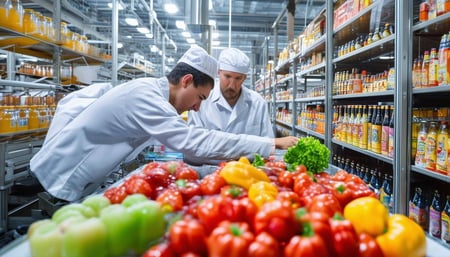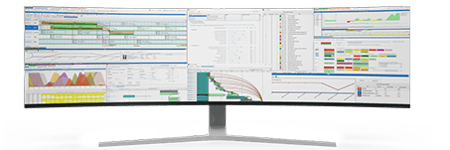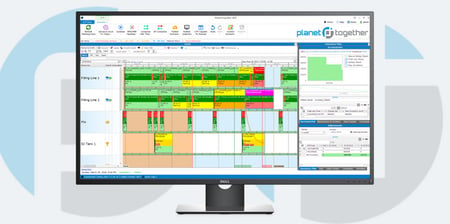Navigating Economic Pressures and Market Shifts
The food and beverage manufacturing sector, a cornerstone of consumer goods production, is often subjected to rapid market changes and economic pressures. For plant managers, this dynamic landscape means not only navigating rising costs and shifting consumer expectations but also improving operational efficiency to stay competitive.
A strong planning foundation, powered by tools like PlanetTogether, integrated with ERP systems such as SAP, Oracle, Microsoft Dynamics, Kinaxis, or Aveva, can be a game-changer, helping plant managers streamline operations, respond quickly to market demands, and improve resource allocation.
In this blog, we’ll look into the challenges that economic pressures and market shifts bring to food and beverage manufacturing, and how integrated planning solutions can support plant managers in making strategic, real-time decisions.

Current Economic Pressures Impacting Food and Beverage Manufacturing
Economic pressures impacting food and beverage manufacturing can stem from various sources, including:
Inflation and Raw Material Costs: Inflation drives up the costs of raw materials, packaging, and transportation. This forces plant managers to find ways to offset these increased costs without compromising quality.
Supply Chain Disruptions: The interconnectedness of global supply chains has highlighted vulnerabilities in the industry. Delays in raw material shipments or unexpected shortages can cause operational hiccups that ripple across production schedules.
Labor Shortages: With many industries facing labor challenges, food and beverage manufacturers must find ways to do more with less, especially during peak demand periods. Labor shortages can slow down production, impacting the overall ability to meet market demands.
Regulatory and Environmental Pressures: Consumer demand for sustainable practices is prompting companies to adopt eco-friendly and compliant production processes, which can increase operational costs.

How Market Shifts Affect Food and Beverage Manufacturing
Besides economic pressures, market shifts are continuously influencing the food and beverage industry. These shifts can include:
Consumer Preferences and Health Trends: Consumers are increasingly favoring organic, plant-based, and healthier food options. Adapting to these trends requires quick and flexible production processes.
Digitalization of the Supply Chain: Consumers and retailers expect traceability from farm to table. This requires sophisticated tracking and integration across manufacturing stages.
E-commerce and Direct-to-Consumer Models: The rise of e-commerce means manufacturers need to adapt to smaller batch production and faster turnaround times, putting strain on traditional production schedules.
To meet these demands and manage economic pressures, plant managers need to reimagine production planning. This is where tools like PlanetTogether, integrated with robust ERPs like SAP, Oracle, Microsoft, Kinaxis, or Aveva, can offer a competitive advantage.
![]()

Leveraging Integrated Planning Solutions: The Role of PlanetTogether and ERP Systems
An integrated planning system such as PlanetTogether, when connected with ERP solutions (like SAP or Microsoft Dynamics), creates a centralized, real-time environment for production planning. This integration can be transformative in tackling economic pressures and adjusting to market shifts. Here’s how:
Real-Time Data Synchronization
In a market where quick decision-making is vital, real-time data synchronization across planning and ERP platforms is essential. For example, a plant manager using PlanetTogether integrated with SAP can synchronize production data with inventory levels and sales forecasts. This enables:
Optimized Resource Allocation: Instead of waiting for manual updates or periodic data refreshes, plant managers can make real-time decisions on resource allocation, helping reduce waste and improve efficiency.
Accurate Demand Planning: By aligning sales data with production schedules, plant managers can better anticipate fluctuations in demand, making it easier to manage batch production or scale up/down operations accordingly.
Enhanced Visibility Across the Supply Chain
Visibility across the supply chain is crucial in times of economic uncertainty. Integration between PlanetTogether and systems like Oracle enables plant managers to track every phase of production, from procurement to distribution. With this visibility:
Supply Chain Risk Mitigation: Early identification of supply chain disruptions, such as delayed ingredient shipments, allows plant managers to adjust schedules proactively, minimizing downtime.
Transparency and Traceability: For brands focused on sustainability, tracking resources from supplier to product can ensure compliance with environmental standards and provide transparency for end consumers.
Production Optimization and Cost Management
An integrated planning solution can significantly enhance production efficiency and control costs. For example, PlanetTogether's integration with Aveva can automate scheduling and adjust resource allocation based on real-time constraints, such as equipment downtime or labor availability. This functionality offers:
Reduced Downtime: Automated scheduling adapts to changing conditions, ensuring production runs at optimal levels without the risk of overuse or unnecessary downtime.
Cost Optimization: By aligning production schedules with the availability of raw materials, plant managers can avoid excess inventory holding costs and reduce wastage.

Adapting to Market Shifts with Integrated Planning Systems
Market demands can change unexpectedly, and an integrated system can provide the agility needed to respond effectively. Here’s how PlanetTogether’s integration with ERPs helps plant managers adapt to these market shifts:
Agility in Production for Changing Consumer Demands
When consumer preferences shift rapidly, production needs to follow suit. For instance, if a new health trend emerges, plant managers might need to prioritize production of a specific line. With an integrated PlanetTogether and Microsoft Dynamics system, a plant manager can:
Quickly Pivot Production Schedules: Integrated systems enable plant managers to adjust production schedules based on real-time market data, ensuring alignment with current trends.
Minimize Waste from Overproduction: By accurately forecasting demand, manufacturers can avoid overproduction, which is especially critical for perishable food items.
Flexible, Small-Batch Manufacturing
With the rise of e-commerce, there is an increasing demand for small-batch, direct-to-consumer production. PlanetTogether’s integration with an ERP like Kinaxis can support:
Flexible Production Schedules: Shift from high-volume to small-batch production as needed, accommodating rapid order fluctuations.
Shortened Lead Times: Integrated systems can reduce the lead time between order and fulfillment, which is essential for meeting consumer expectations in a direct-to-consumer model.
As economic pressures continue and markets evolve, the integration of planning solutions like PlanetTogether with powerful ERP systems will be increasingly vital. Plant managers who adopt integrated planning systems will find themselves better equipped to handle unforeseen challenges, optimize resource use, and maintain profitability. Looking ahead, these systems will likely advance further with AI-driven demand forecasting and enhanced automation, offering even greater support in navigating industry complexities.
Economic pressures and market shifts are an inevitable part of food and beverage manufacturing. However, with the right integrated planning tools, plant managers can streamline operations, reduce costs, and remain agile in the face of change. Tools like PlanetTogether, paired with ERP systems like SAP, Oracle, Microsoft, Kinaxis, or Aveva, represent a powerful resource for forward-thinking manufacturers aiming to maintain resilience and adaptability in a competitive market.
Are you ready to take your manufacturing operations to the next level? Contact us today to learn more about how PlanetTogether can help you achieve your goals and drive success in your industry.
Topics: PlanetTogether Software, Real-Time Data Synchronization, Integrating PlanetTogether, Enhanced Visibility Across the Supply Chain, Food and Beverage Manufacturing, Flexible, Small-Batch Manufacturing, Production Optimization and Cost Management, Changing Consumer Demands




















LEAVE A COMMENT